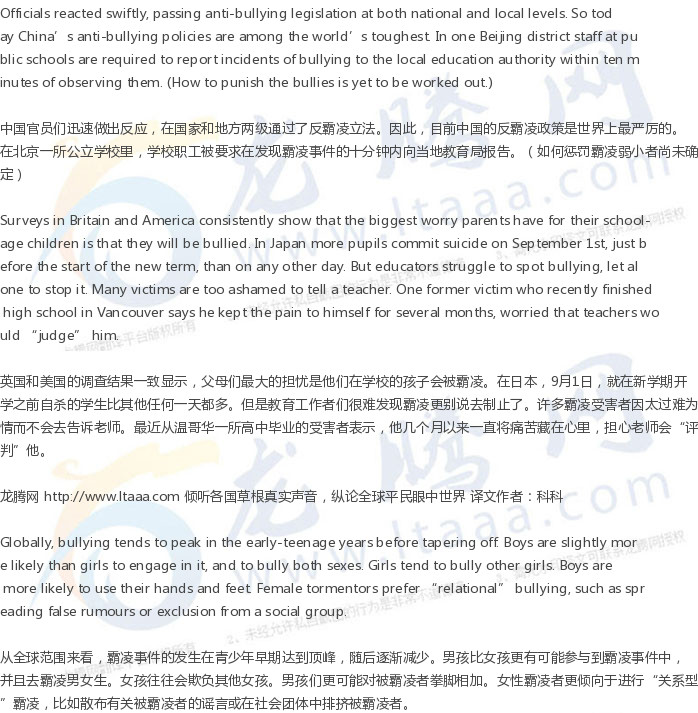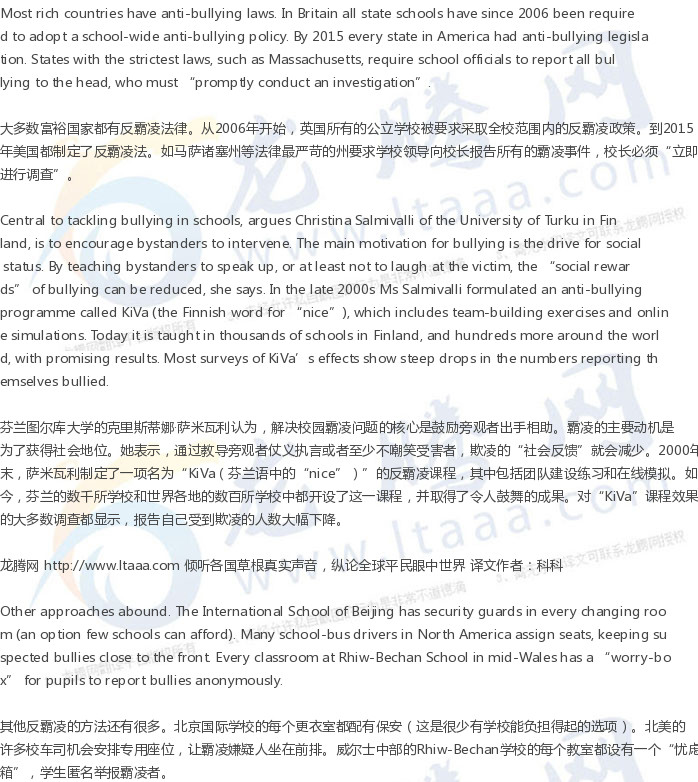家长们最担心是校园霸凌 [美国媒体]
2016年,北京的一位母亲在中国的社交媒体应用微信上发朋友圈抱怨道:“他们强迫我10岁的儿子把用过的厕纸盖到头上。”她的朋友圈被疯狂转发。这触动了中国的神经,在中国,校园霸凌历来被视为一种成年仪式。
Parents worry more about bullying than anything else
家长们最担心是校园霸凌
“THEY forced my ten-year-old son to wear used toilet paper on his head,” complained a mother in Beijing on WeChat, a Chinese social-media site, in 2016. Her post soon went viral. It touched a nerve in a country where school bullying has traditionally been seen as a rite of passage. Her son’s school, one of the best in Beijing, dismissed the brouhaha as “harmless mischief between kids”. But a spate of reports about even more vicious acts of bullying at other schools soon followed.
2016年,北京的一位母亲在中国的社交媒体应用微信上发朋友圈抱怨道:“他们强迫我10岁的儿子把用过的厕纸盖到头上。”她的朋友圈被疯狂转发。这触动了中国的神经,在中国,校园霸凌历来被视为一种成年仪式。他儿子就读的是北京最好的学校之一,该校将这场骚动斥为“孩子间的无害恶作剧”。然而,随后又有大量的报道称,其他学校发生了更多的恶性霸凌事件。
Children who are from ethnic minorities, short, obese, disabled, gay or have poor social skills are at higher risk. Victims of bullying may in turn bully others. In America bullies pick on “nerds”. In China and South Korea, by contrast, those with poor grades are at higher risk. A study in 2013 of the Arab world found that the best predictor of being bullied was having crooked teeth. But bullied children everywhere risk long-term health effects. A graduate student at Oxford University says he was “emotionally scarred for at least five years” after being tormented in middle school in Hong Kong.
少数民族、矮小、肥胖、残疾、同性恋或社交能力差的孩子受霸凌的风险更高。被霸凌的孩子反过来也会霸凌其他其他孩子。在美国,恶霸欺负“书呆子”。而相比之下,在中国和韩国,成绩差的学生更容易被霸凌。2013年对阿拉伯世界的一项研究发现牙齿不齐的人最容易被欺凌。但是世界各地被霸凌的孩子都存在着长期健康影响的风险。牛津大学的一名研究生表示他在香港读中学时饱受折磨,“承受了至少五年的情感创伤”。
The prence of bullying varies greatly across the world. Data, largely based on students’ own reports, probably underestimate the scale of the problem. They suggest bullying is most common in parts of Africa. A survey from 2011 found that 70% of Egyptian 13- to 15-year-olds reported being bullied at least once in the past 30 days. At the other end of the spectrum stands Sweden, where, according to a poll from 2014, only 11% of children in the same age group reported being bullied in the past month. In America, Britain and Canada the rate is between a quarter and a third. Cross-country comparisons, however, are problematic. Perceptions of what constitutes bullying vary across borders. For instance, the Chinese word for bullying, qifu, has a very physical connotation.
霸凌行为在世界各地的发生率差别很大。主要基于学生自主报告所得的数据可能低估了这一问题的严重性。这一数据显示霸凌行为在非洲的部分地区最为普遍。2011年的一项研究表明13岁到15岁的埃及人中有70%在过去30天内至少遭受一次霸凌。另一个极端是瑞典,2014年的民意调查显示同一年龄段的孩子中,在过。去一个月里仅有11%受到欺凌。在美国、英国和加拿大,这一比率介于四分之一到三分之一之间。然而,跨国比较是有问题的。不同国家对霸凌的认知也不尽相同。例如,汉语中“bullying”一词是“欺负”,有着非常具体的含义。
Anthony Parker, head of Weston High School in Massachusetts, says he informs parents any time their child is accused of bullying. Nine times out of ten, the bullying then stops. An anti-bullying bill proposed in March in Pennsylvania would allow a judge to mandate community service or levy a $500-750 fine on parents if their child is caught bullying, starting from the third offence.
马萨诸塞州韦斯顿中学校长安东尼·帕克表示每当一个孩子被指控欺凌弱小时,他会随时通知孩子的父母。十有八九,孩子的霸凌行为就会停止。今年3月,宾夕法尼亚州提出一项反霸凌法案允许法官从第三次霸凌开始强制被指控霸凌的孩子进行社区服务或对其父母处以500到750美元的罚款。
Some approaches have been shown to backfire. “Restorative” methods that put the bully and victim together to patch things up may end up further traumatizing the victim. Some sorts of punishment, like expulsion from school, may simply shift the problem elsewhere.
一些方法已经被证明是“适得其反”了。“恢复性”方法是让霸凌者和受害者握手言和,可能最终会进一步伤害受害者。一些惩罚措施如开除学籍可能只是把问题转移到其他地方。
Cultural differences complicate the picture. In China, for example, rural migrant workers in cities are treated as second-class citizens. Their children, when bullied, may attract less sympathy from teachers. Such unfairness helps explain why, distressingly, some victims will always decide that the only answer to bullying is to fight fire with fire. One such, Alexander, a 23-year-old now working in Canada who spent part of his childhood in Uzbekistan, says that “sometimes you have no choice but to match the aggressiveness of the bully. It worked for me.”
文化差异将这一问题复杂化了。比如,在中国,进城农民工被视为二等公民。当他们的孩子受到欺凌时可能会更少得到老师的同情。这种不公平帮助解释了为什么一些受害者总是认为解决霸凌的唯一办法就是以牙还牙。如今在加拿大工作的23岁的亚历山大就是其中之一,小时候在乌兹别克斯坦度过一段时间,他表示,“有时你别无选择,只能与他们争狠斗勇。这种方法很管用。”
版权声明
我们致力于传递世界各地老百姓最真实、最直接、最详尽的对中国的看法
【版权与免责声明】如发现内容存在版权问题,烦请提供相关信息发邮件,
我们将及时沟通与处理。本站内容除非来源注明五毛网,否则均为网友转载,涉及言论、版权与本站无关。
本文仅代表作者观点,不代表本站立场。
本文来自网络,如有侵权及时联系本网站。
图文文章RECOMMEND
热门文章HOT NEWS
-
1
Why do most people who have a positive view of China have been to ...
- 2
- 3
- 4
- 5
- 6
- 7
- 8
- 9
- 10
推荐文章HOT NEWS
-
1
Why do most people who have a positive view of China have been to ...
- 2
- 3
- 4
- 5
- 6
- 7
- 8
- 9
- 10













